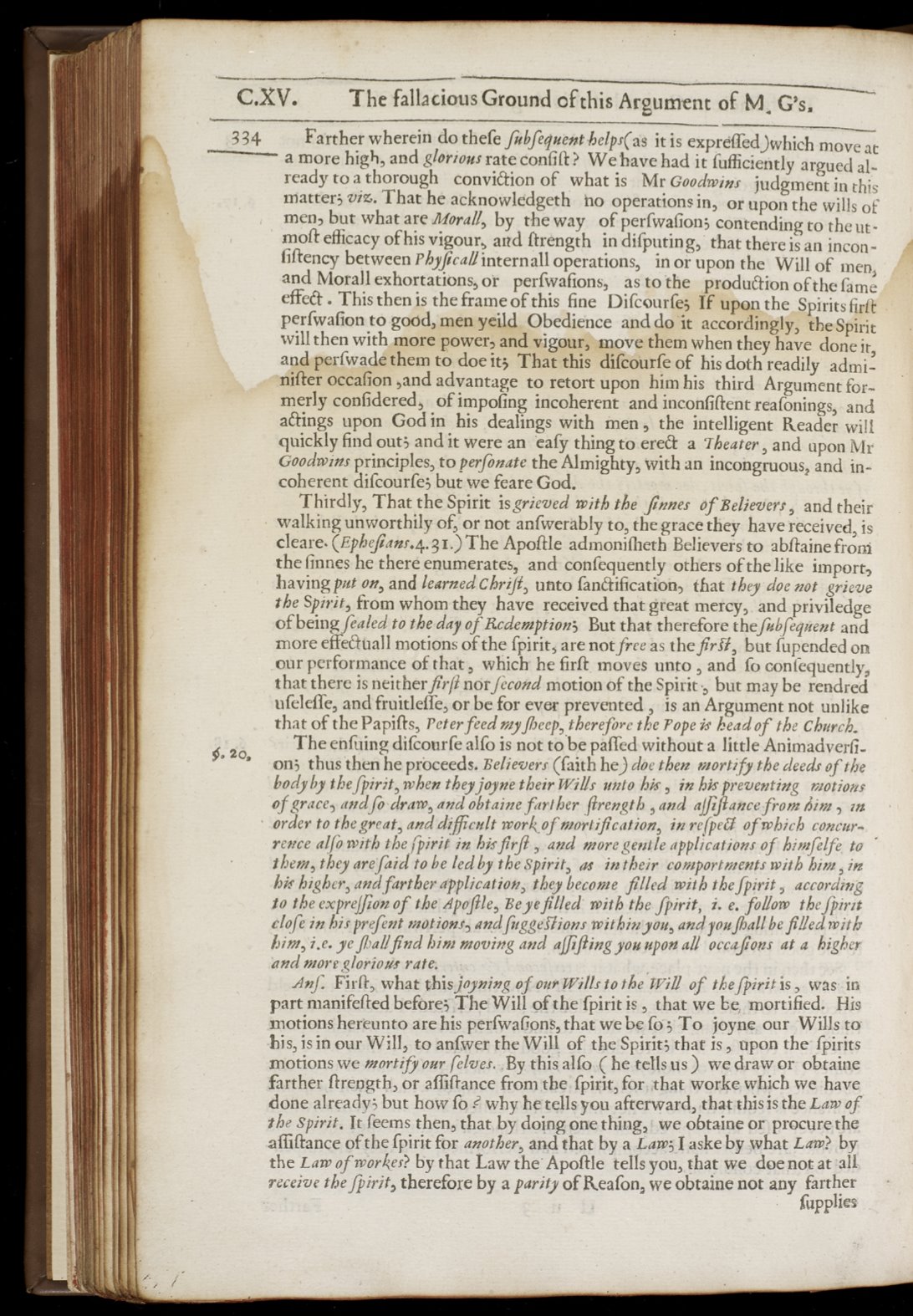

C.XV.
The
fallacious
Ground
of
this
Argument
of
M; G's.
334
Farther
wherein do thefe
fubfequenthelps(as
it
is
expreffed)which
move
at
a more high, and
glorious
rate
confift
?
We
have had
it
fufficiently
argued al-
ready to
a
thorough
convi
&ion
of
what
is
Mr Goodwin
judgment
in this
matter; viz.
That
he acknowlédgeth no operations in,
or
upon
the
wills
of
men, but what are
Morall,
by
the
way
of
perfwauon; contending
to
the ut-
moft
efficacy
of
his
vigour, and
ftrength
in
difputing,
that
there
is
an incon-
fiftency
between
Phyficall
internall
operations,
in
or
upon the Will
of
men,
and Morali exhortations,
or
perfwafions, as
to
the
produ
&ion
of
the
fame
effect
.
This then
is
the
frame
of
this
fine
Difcourfe;
If
upon
the
Spirits
firft
perfwafion
to
good, men yeild Obedience and do it accordingly, the
Spirit
will
then
with more power, and vigour, move them
when they have done
it,
and perfwade them
to
doe it
That
this difcourfe
of
his
doth
readily admi-
nifter occafion
,and advantage to retort
upon
him
his
third
Argument for-
merly confidered,
of
impofing
incoherent and
inconfi(tent reafonings,
and
a&ings
upon God
in his
dealings with men , the intelligent Reader
will
quickly
find
out;
and
it
were an
eafy
thing
to
ere&
a
?heater, and
upon
Mr
Goodwins
principles,
to
perfonate
the
Almighty; with an incongruous, and in-
coherent
difcourfe;
but
we feare God.
Thirdly,
That the
Spirit
is
grieved with the finnes
of
Believers,
and
their
walking unworthily
of, or
not
anfwerably
to,
the grace they have received,
is
cleare. (Ephefaans.4.31.)The Apoftle admonifheth
Believers
to
abftainefronì
the
finnes he
there
enumerates,
and
confequently others
of
the like import,
having
put
on,
and
learned Chriji,
unto
fan&ificat'ion,
that
they
doe
not
grieve
the
Spirit, from whom they
have
received
that
great
mercy,. and priviledge
of
being
Pealed
to
the
day
of
Redemption;
But
that
therefore
thefubfeguent
and
more
effe&nall
motions
of
the fpirit,
are
notfree
as
the
fir.fl,
but
fupended on
our
performance
of that
, which he
firft
moves
unto
, and
fo
confequently,
that
there
is
neitherfirfl
nor
f
econd
motion
of
the
Spirit
",
but
may
be rendred
ufeleffe,
and fruitleffe,
or
be for ever prevented
, is
an
Argument
not
unlike
that of
the
Papifts,
Peter
feed
my
fheep, therefore the
Pope
is
head
of
the
Church.
¢,
zo,
The
enfuing difcourfe
all() is
not
to be
pawed
without
a
little
Animadverfi-
on; thus then
he pròceeds.
Believers
(faith
he)
doe
then mortify the
deeds
of
the
body
by
the
fpirit,when
they
joyne
their
Wills unto
his,
in
his
preventing
motions
of
grace,
and
fo
draw,
and
obtaine
farther
flrength
,
and
afJ,
fiance
from
km
,
rn
order
to
the
great, and
difficult
workof
mortification,
in
re(pelt
ofwhich
concur-
rusty
alfe
with the
fpirit
in
his
fzrfi
, and
more
gentle
applications
of
himfelfe.
to
them,
they
are
Paid
to
be
led
by
the Spirit,
as
in
their
comportments with
him, in
his
higher,
and
farther
application,
they become
filled
with the
fpirit,
according
to
the
expreon of
the
Apofile,
Be
ye
filled
with
the
fpirit,
i.
e.
follow the
fpirit
clofe
in
his prefent motions,
andfnggeIlions within
you,
and
you
fháll
be
filledwith
him,
i.e. ye
(hall
find
him moving
and
aJfiing
you
upon
all
occafrons
at
a higher
and
more
glorious
rate:
Anf.
Fief},,
what this
joyning
of
our Wills to
the Will
of
the
fpirit
is,
was in
part
manifefted before;
The
Will
of
the
fpirit
is
,
that
we
be,
mortified.
His
motionshereunto are
his
perfwafions,
that
we be
fo; To
joyne our Wills
to
his,
is
in
our
Will,
to
anfwer
the Will
of
the
Spirit;
that
is,
opon
the
fpirits
motions
we
mortify our felves.
By
this allo
(he
tells
us)
we draw
or
obtaine
farther ftrength,
or
afiìftance from
the
fpirir, for
that
worke
which we have
done
already;
but
how
fo ?
why he tells
you afterward,
that
this
is
the
Law
of
the Spirit.
It
feems
then,
that, by doing one
thing,
we
obtaine
or
procure the
affìftance
of
the fpirit for
another,
and
that
by
a Law;
I aske
by
what
Law?
by
the
Law
of
worker?
by
that
Law
the
Apoftle tells you,
that
we doe
not
at all
receive
the
fpirit,
therefore
by
a parity
of
Keafon,
we
obtaine
not
any farther
fupplies










